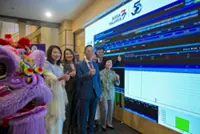BARCELONA: Global fashion retailers gathering in Barcelona this week will discuss how they respond to pressure from regulators and consumers to move to more sustainable models while reversing declining sales in Europe.
Executives from companies including Chinese fast-fashion retailer Shein, Spain’s Mango and Ireland’s Primark are among those attending the World Retail Congress, one of the industry’s biggest annual conferences.





